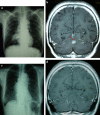Total regression of brain metastases in non-small cell lung cancer patients harboring EGFR mutations treated with gefitinib without radiotherapy: two case reports
- PMID: 26724810
- PMCID: PMC4698324
- DOI: 10.1186/s13104-015-1834-0
Total regression of brain metastases in non-small cell lung cancer patients harboring EGFR mutations treated with gefitinib without radiotherapy: two case reports
Abstract
Background: Gefitinib is an epidermal growth factor receptor tyrosine kinase inhibitor. Clinical trials have reported its effectiveness in the treatment of brain metastases from non-small cell lung cancer by overcoming the blood-brain barrier. Gefitinib is generally regarded as a relatively safe agent, and several reports have described its efficacy in patients with epidermal growth factor receptor mutation-positive non-small cell lung cancer and a poor performance status.
Case presentation: We herein described two patients with brain metastasis from non-small cell lung cancer who achieved the total regression of metastasis with the administration of gefitinib. A 70-year-old Japanese woman was referred to our hospital with a severe cough. Brain magnetic resonance imaging revealed a metastatic lesion in the left temporal lobe. The tumor was positive for an epidermal growth factor receptor L858R mutation in exon 21 using the peptide nucleic acid-locked nucleic acid polymerase chain reaction clamp method. She was treated with 250 mg gefitinib per day, and, 1 month later, the primary lesion and brain metastasis had totally resolved. A 58-year-old Japanese woman was referred to our hospital with nausea and headache. Brain magnetic resonance imaging revealed a metastatic lesion in the left cerebellar hemisphere and meningeal dissemination. The tumor was positive for the epidermal growth factor receptor L858R mutation in exon 21. She was treated with 250 mg gefitinib per day, and, 3 weeks later, the primary lesion, brain metastasis, and meningeal dissemination had completely resolved.
Conclusion: We successfully treated two lung cancer patients with brain metastasis using gefitinib. Gefitinib therapy may be a suitable treatment for brain metastasis in lung cancer with an epidermal growth factor receptor mutation, particularly in elderly patients with a poor performance status.
Figures


Similar articles
-
Comparison of clinical outcomes following gefitinib and erlotinib treatment in non-small-cell lung cancer patients harboring an epidermal growth factor receptor mutation in either exon 19 or 21.J Thorac Oncol. 2014 Apr;9(4):506-11. doi: 10.1097/JTO.0000000000000095. J Thorac Oncol. 2014. PMID: 24736073
-
Clinical impact of switching to a second EGFR-TKI after a severe AE related to a first EGFR-TKI in EGFR-mutated NSCLC.Jpn J Clin Oncol. 2012 Jun;42(6):528-33. doi: 10.1093/jjco/hys042. Epub 2012 Mar 28. Jpn J Clin Oncol. 2012. PMID: 22457323
-
Erlotinib accumulation in brain metastases from non-small cell lung cancer: visualization by positron emission tomography in a patient harboring a mutation in the epidermal growth factor receptor.J Thorac Oncol. 2011 Jul;6(7):1287-9. doi: 10.1097/JTO.0b013e318219ab87. J Thorac Oncol. 2011. PMID: 21847041
-
Brain Metastases in NSCLC - are TKIs Changing the Treatment Strategy?Anticancer Res. 2015 Nov;35(11):5797-806. Anticancer Res. 2015. PMID: 26504000 Review.
-
Brain metastasis responding to gefitinib alone.Oncology. 2004;67(2):174-8. doi: 10.1159/000081005. Oncology. 2004. PMID: 15539923 Review.
Cited by
-
Epidermal growth factor receptor mutations and brain metastases in non-small cell lung cancer.Front Oncol. 2022 Nov 15;12:912505. doi: 10.3389/fonc.2022.912505. eCollection 2022. Front Oncol. 2022. PMID: 36457515 Free PMC article. Review.
-
Osimertinib is associated with improved outcomes in pre-treated non-small cell lung cancer leptomeningeal metastases: A systematic review and meta-analysiss.Heliyon. 2024 Apr 17;10(9):e29668. doi: 10.1016/j.heliyon.2024.e29668. eCollection 2024 May 15. Heliyon. 2024. PMID: 38698967 Free PMC article.
-
Brain Metastasis Mimicking Glioma on Imaging Appearance During Tyrosine Kinase Inhibitor Administration: A Case Series and Literature Review.Cureus. 2023 Aug 16;15(8):e43591. doi: 10.7759/cureus.43591. eCollection 2023 Aug. Cureus. 2023. PMID: 37719531 Free PMC article.
-
[Treatment for Brain Metastases from EGFR Mutations NSCLC Patients: How Should We Choose in Clinical Practice?].Zhongguo Fei Ai Za Zhi. 2020 Aug 20;23(8):631-637. doi: 10.3779/j.issn.1009-3419.2020.101.29. Epub 2020 Aug 4. Zhongguo Fei Ai Za Zhi. 2020. PMID: 32746605 Free PMC article. Review. Chinese.
-
Synthesis of Novel Hybrids of Quinazoline and Artemisinin with High Activities against Plasmodium falciparum, Human Cytomegalovirus, and Leukemia Cells.ACS Omega. 2017 Jun 30;2(6):2422-2431. doi: 10.1021/acsomega.7b00310. Epub 2017 Jun 1. ACS Omega. 2017. PMID: 30023664 Free PMC article.
References
-
- Maemondo M, Minegishi Y, Inoue A, Kobayashi K, Harada M, Okinaga S, et al. First-line gefitinib in patients aged 75 or older with advanced non-small cell lung cancer harboring epidermal growth factor receptor mutations: NEJ 003 study. J Thorac Oncol. 2012;7(9):1417–1422. doi: 10.1097/JTO.0b013e318260de8b. - DOI - PubMed
-
- Nagai Y, Miyazawa H, Huqun Tanaka T, Udagawa K, Kato M, et al. Genetic heterogeneity of the epidermal growth factor receptor in non-small cell lung cancer cell lines revealed by a rapid and sensitive detection system, the peptide nucleic acid-locked nucleic acid PCR clamp. Cancer Res. 2005;65(16):7276–7282. doi: 10.1158/0008-5472.CAN-05-0331. - DOI - PubMed
Publication types
MeSH terms
Substances
LinkOut - more resources
Full Text Sources
Other Literature Sources
Medical
Research Materials
Miscellaneous

